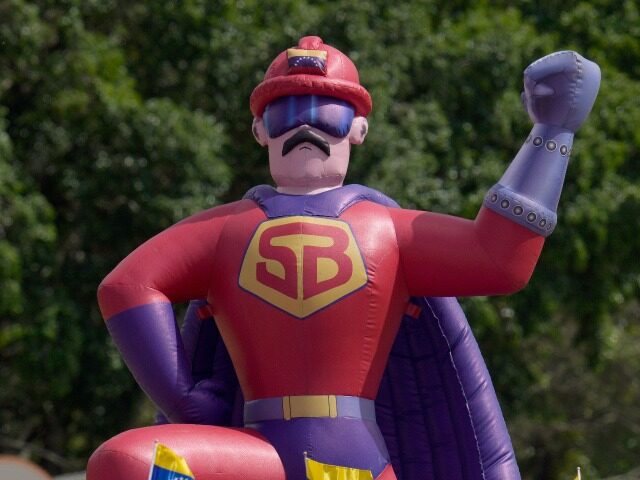CARACAS, Venezuela – Police in Barquisimeto, Lara state, reportedly seized an effigy meant to be burned of Súper Bigote (“Super Mustache”), socialist dictator Nicolás Maduro’s superhero alter ego, on Wednesday.
The effigy, erected by residents of the Cruz Blanca community in Barquisimeto, was slated to be burned on Easter Sunday as part of the local community’s Burning of Judas celebrations.
The Maduro regime debuted “Super Mustache” – Nicolás Maduro in an American-style superhero costume – in cartoon propaganda in 2021. “Super Mustache” typically fights capitalists, generic American government officials, and members of Venezuela’s establishment “opposition.”
The burning of Judas is a Catholic Easter tradition where an effigy of “Judas” Iscariot is judged, hanged, and burned to mark the Apostle’s betrayal of Jesus Christ. In Venezuela, the figure of Judas has historically been represented by effigies of politicians and/or public figures as a symbolic way for people to express dissatisfaction with those considered a threat to society or deserving of mockery or scorn.
The centuries-old tradition, brought to the region by Spain, has taken on heightened political significance in Venezuela during the past two decades of socialist rule and especially throughout the past ten years of Maduro’s leadership in Venezuela and the ongoing collapse of “Bolivarian Socialism.” As Maduro’s regime imprisons, tortures, and kills political dissidents, many Venezuelans have taken to using the religious rite to express themselves.
The Venezuelan socialist regime, which has never shied away from hijacking religion to further its goals, has also co-opted the burning of Judas for its own political messaging. In recent years, the socialists’ chosen Judases have been represented by effigies of American former President Donald Trump, Venezuelan former interim President Juan Guaidó, and members of Venezuela’s establishment “opposition.”
Local news website Cabudare Digital reported on Wednesday that word of mouth began spreading of a “Super Mustache” effigy in the community this week, prompting locals to throw trash at it, surround it with garbage, and curse it.
On Wednesday, four police officers reportedly arrived at the location of the effigy, untied it from its post, and took it away in a cart.
Recuerdan este "Súper Bigote" que me encontré en Cruz Blanca de #Barquisimeto y que sería quemado como judas?
Resulta que al día siguiente, funcionarios de @Polilaraoficial lo "incautaron" o lo "secuestraron". Cuatro policías llegaron al lugar y se lo llevaron en una carrucha. https://t.co/dc743FcwVk pic.twitter.com/6RGBSBctOB
— Héctor "Sam0li" Rodríguez (@samolihector) April 6, 2023
Súper Bigote is the Maduro regime’s socialist ripoff of America’s iconic Superman — created even though the socialist regime has repeatedly insisted that the concept of American superheroes is detrimental to the socialist revolution’s values. Maduro has gone as far as to directly blame Spiderman for Venezuela’s violent crime.
The ideologically-loaded socialist cartoon presents an idealized version of Maduro that, with his “iron hand” and mustache that makes him “invincible,” fights Mister Odio (“Mister Hate”), a cartoonish rendition of former President Donald Trump. “Super Mustache” thwarts his nefarious plans against Venezuela, often carried out by depictions of Venezuelan “opposition” figures. Some of the most glaring problems in Venezuela, such as power blackouts and inflation, are presented in the form of monster-like enemies that Maduro’s superhero alter-ego fights off — even though, in reality, the socialist regime’s mismanagement or corruption is behind these problems.
The socialist regime has expanded Súper Bigote’s ideological reach by launching a complete merchandise line that features school supplies, costumes for children, action figures given away to children during Christmas, and a salsa theme song.
Although the Venezuelan socialist regime has maintained a longstanding animosity and kept a strained relationship with the Venezuelan Catholic Church — going as far as to declare the Evangelical Christian church in the country “the true church of God” — the socialist regime has not prohibited Catholic traditions in the country outside of restrictions related to the Wuhan coronavirus pandemic in 2020.
Maundy Thursday and Good Friday are national holidays in Venezuela. As such, most public and private workplaces in the country either shut down completely during those days or operate at reduced hours from Maundy Thursday to Easter Sunday, with some closing down earlier during Holy Week.
Venezuelans, who are 71 percent Catholic, have been able to participate in the Holy Week traditions and Easter without major issues this year outside of one incident in which a driver ran over a cyclist in the middle of the procession of the Nazarene on Wednesday in the city of Valencia, Carabobo, injuring at least five participants. The driver was arrested shortly afterward.
Christian K. Caruzo is a Venezuelan writer and documents life under socialism. You can follow him on Twitter here.

COMMENTS
Please let us know if you're having issues with commenting.